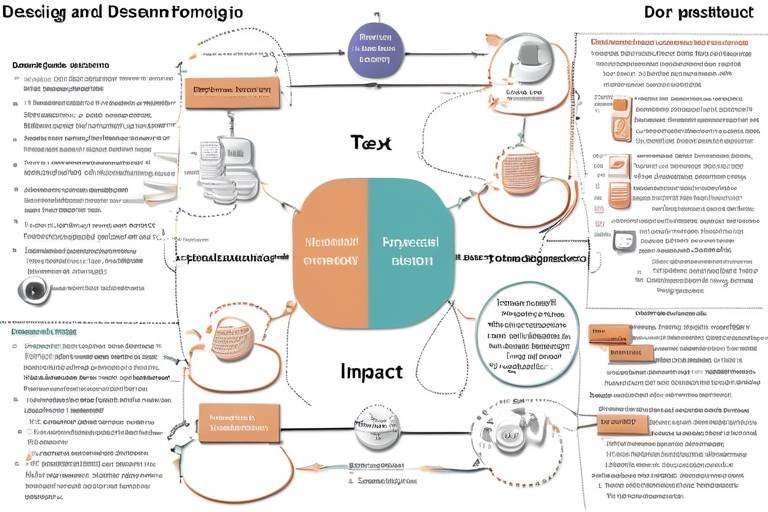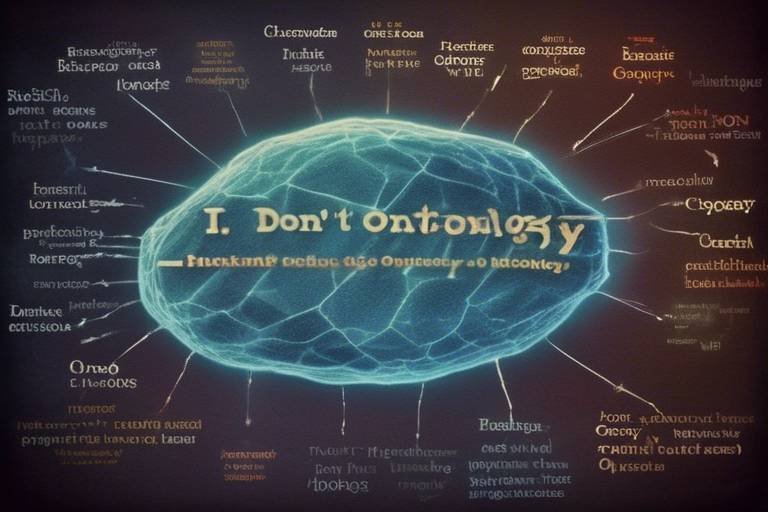Ontology and its Impact on Information System Designing
In the digital age, where information flows like a raging river, the way we structure and understand that information becomes increasingly crucial. Ontology serves as the backbone of this structure, providing a formal representation of knowledge that is vital for effective information system design. But what exactly is ontology, and why does it matter? Think of ontology as a sophisticated map that guides us through the vast landscape of data, helping us navigate the complexities of relationships and concepts within various domains.
At its core, ontology defines the concepts within a specific domain and elucidates the relationships between these concepts. This formal representation is not just an academic exercise; it plays a pivotal role in enhancing data interoperability and improving knowledge representation. Imagine trying to communicate with someone who speaks a different language. Without a common vocabulary, misunderstandings abound. Similarly, in the realm of information systems, ontologies provide that common language, enabling seamless communication and understanding among disparate systems.
As we dive deeper into the role of ontology in information system design, we uncover its ability to facilitate data interoperability. In a world where information systems are often siloed and fragmented, ontologies act as the glue that binds them together. By establishing a shared vocabulary and standardizing terms, ontologies eliminate ambiguity, ensuring that data can be accurately exchanged and integrated across various platforms. This is akin to having a universal translator that allows different systems to speak the same language, fostering collaboration and enhancing overall efficiency.
Moreover, ontology enhances the capabilities of semantic web technologies. These technologies leverage ontological frameworks to improve data retrieval and linking, making it easier for users to find the information they need. Picture searching for a needle in a haystack; without proper organization, it can be a daunting task. However, with ontologies in place, that needle becomes much easier to locate, as the data is structured in a way that is intuitive and accessible.
Yet, while the benefits of ontology in information systems are clear, implementing these frameworks is not without its challenges. The complexity of domain modeling can be overwhelming, as accurately representing real-world scenarios requires a deep understanding of the domain in question. Additionally, ontologies must be maintained and evolved to stay relevant in the face of rapidly changing technologies and knowledge. This ongoing maintenance is akin to tending to a garden; without regular care, what once flourished can quickly become overgrown and unmanageable.
Looking ahead, the future of ontology in information systems is bright. As technology continues to evolve, so too will the role of ontology in shaping how we design and interact with these systems. Emerging trends, such as artificial intelligence and machine learning, are set to further enhance the capabilities of ontologies, making them even more integral to the design of information systems. The landscape is changing, and those who embrace the power of ontology will undoubtedly find themselves at the forefront of this transformation.
- What is ontology in the context of information systems?
Ontology refers to a formal representation of knowledge that defines the concepts and relationships within a specific domain, facilitating better data organization and understanding. - How does ontology improve data interoperability?
By establishing a common vocabulary and standardizing terms, ontologies help eliminate ambiguity, allowing for seamless data exchange and integration across different systems. - What are some challenges in implementing ontologies?
Challenges include the complexity of accurately modeling domains and the need for ongoing maintenance to keep ontologies updated with changing knowledge and technology. - What future trends can we expect in ontology and information systems?
Emerging technologies such as artificial intelligence and machine learning will enhance the capabilities of ontologies, making them even more crucial in the design of information systems.

Understanding Ontology
Ontology, at its core, is like a detailed map of knowledge within a specific domain. Imagine you're trying to navigate a new city without a map; you'd likely get lost or miss out on important landmarks. Similarly, ontology provides a structured framework that defines various concepts, entities, and the intricate relationships between them. This structure not only enhances our understanding but also facilitates communication between different systems and stakeholders.
So, why is ontology so significant in the realm of information systems? Well, consider the vast amount of data generated every day. From social media posts to scientific research, this data is often siloed within different applications and formats. Ontology acts as a bridge, allowing disparate systems to communicate effectively. By establishing a common understanding of terms and concepts, ontologies enable seamless data exchange, ensuring that everyone interprets information in the same way.
To illustrate this, let's break down the foundational principles of ontology:
- Conceptualization: This involves identifying the key concepts within a domain. For instance, in the healthcare domain, concepts might include patients, doctors, treatments, and diseases.
- Relationships: Ontologies define how these concepts relate to one another. For example, a patient might receive treatment from a doctor, or a disease might be treated with a specific medication.
- Formal Representation: Ontologies use formal languages to represent knowledge. This ensures that both humans and machines can understand and process the information accurately.
Moreover, ontologies are not just static entities; they evolve over time. As new knowledge is discovered or as domains change, ontologies must adapt to remain relevant. This adaptability is crucial in fields like technology and medicine, where advancements happen rapidly. Thus, understanding ontology is not merely an academic exercise; it's a practical necessity for anyone involved in designing information systems.
In conclusion, ontology serves as a foundational pillar in the design of information systems. By providing a clear and structured representation of knowledge, it enhances data interoperability, improves knowledge representation, and ultimately leads to more effective decision-making processes. As we delve deeper into the role of ontology in data interoperability and knowledge representation, it's essential to grasp its significance fully.

The Role of Ontology in Data Interoperability
In today's digital landscape, where data flows like a river across various platforms and applications, data interoperability emerges as a crucial element for the success of information systems. Imagine trying to communicate with someone who speaks a different language; without a common tongue, the message gets lost, and confusion reigns. This is precisely the challenge that ontologies aim to address. By providing a structured framework that defines the relationships between various concepts within a domain, ontologies enable seamless data exchange and integration, ensuring that information is not just shared but understood.
At its core, ontology serves as a bridge between disparate systems, transforming isolated data into a cohesive narrative. When different systems adhere to a shared ontology, they can "speak" to each other more effectively. This is particularly valuable in sectors such as healthcare, finance, and education, where data from various sources needs to be integrated for comprehensive analysis. For instance, consider a scenario where patient data from hospitals, insurance companies, and laboratories needs to be aggregated. An ontology that defines key concepts such as patient, diagnosis, and treatment allows these diverse entities to understand each other's data formats and terminologies, leading to improved patient care and operational efficiency.
Furthermore, ontologies enhance data interoperability by establishing a common vocabulary. When systems utilize a standardized set of terms, the risk of miscommunication diminishes significantly. This shared language not only facilitates better understanding among systems but also fosters collaboration. For example, in a research setting, different teams may be working with various datasets. By employing a common ontology, researchers can ensure that when they refer to a specific term, such as gene or protein, everyone is on the same page. This clarity is essential for effective collaboration and data sharing, ultimately leading to more robust research outcomes.
Additionally, ontologies play a vital role in the standardization of terms. In the absence of a standardized vocabulary, ambiguity can lead to significant errors in data interpretation. Consider a situation where two systems utilize the term "employee" but define it differently; one might include part-time workers, while the other does not. Such discrepancies can result in faulty data analysis and misguided decisions. By standardizing terms within an ontology, organizations can enhance data accuracy and reliability, which are pivotal for informed decision-making.
Moreover, the rise of semantic web technologies has further underscored the importance of ontologies in data interoperability. These technologies leverage ontological frameworks to improve data retrieval processes, enabling systems to understand the context and meaning behind the data. For instance, search engines that utilize ontologies can provide more relevant results by interpreting user queries in relation to the underlying concepts defined in the ontology. This capability not only enhances user experience but also maximizes the potential of the data being queried.
In conclusion, the role of ontology in data interoperability cannot be overstated. By establishing a common vocabulary, standardizing terms, and facilitating the use of semantic web technologies, ontologies serve as the backbone of effective information systems. As organizations continue to grapple with the complexities of data integration, embracing ontological frameworks will be key to unlocking the full potential of their data assets. The future of information systems hinges on our ability to communicate effectively across diverse platforms, and ontology is the key that will unlock this potential.

Defining Common Vocabulary
In the intricate world of information systems, a common vocabulary serves as the foundation for effective communication. Think of it as a universal language that bridges gaps between diverse systems, allowing them to converse seamlessly. When different platforms and applications use varied terminologies, misunderstandings can occur, leading to inefficiencies and errors. This is where ontologies step in, providing a structured framework that defines key concepts and their interrelationships within a specific domain.
By establishing a common vocabulary, ontologies enhance collaboration among different information systems. Imagine trying to explain a complex idea to someone who speaks a different language; it can be frustrating and lead to misinterpretations. Similarly, when systems lack a shared vocabulary, the data exchange becomes cumbersome, and the potential for miscommunication increases. Ontologies mitigate this risk by offering a clear and precise set of terms that all systems can understand.
One of the most significant advantages of having a common vocabulary is data interoperability. With a standardized language in place, data can flow more freely between systems, allowing for better integration and utilization. For example, consider a healthcare information system that needs to share patient data with a pharmacy. If both systems use different terms for medications, it can lead to confusion and potential errors in patient care. However, with an established ontology, both systems can refer to medications in the same way, ensuring accurate and efficient communication.
Moreover, a common vocabulary facilitates the development of semantic web technologies. These technologies rely on ontologies to enhance data retrieval and linking capabilities. By using a shared vocabulary, search engines and other tools can better understand the context and meaning of the data, leading to more relevant and accurate search results. This is particularly important in a world where information is abundant, and users seek quick and reliable access to knowledge.
In summary, defining a common vocabulary through ontologies is not just a technical requirement; it is a crucial aspect of building effective information systems. It fosters communication, enhances data interoperability, and supports the advancement of semantic web technologies. By ensuring that all systems speak the same language, we pave the way for improved collaboration and efficiency across various domains.
- What is an ontology? An ontology is a formal representation of knowledge that defines concepts and their relationships within a specific domain.
- How does a common vocabulary benefit information systems? It enhances communication, reduces misunderstandings, and facilitates data interoperability between different systems.
- What role do ontologies play in semantic web technologies? Ontologies provide a structured framework for data retrieval and linking, improving the relevance and accuracy of search results.
- Why is maintaining a common vocabulary important? A consistent vocabulary helps eliminate ambiguity, ensuring that all systems interpret data in the same way, which is essential for accuracy and reliability.

Standardization of Terms
In the intricate world of information systems, the is not just a minor detail; it is a cornerstone that supports the entire structure of data communication. Imagine trying to have a conversation with someone who speaks a different language. Frustrating, right? This is precisely what happens when different systems use varying terminologies. Standardizing terms within ontologies acts as a universal translator, allowing disparate systems to communicate effectively and efficiently.
When we talk about standardization, we refer to the process of defining a consistent vocabulary that can be universally understood across various platforms. This is especially crucial in fields such as healthcare, finance, and education, where precise terminology can mean the difference between life and death or profit and loss. By establishing a common language, ontologies help to eliminate ambiguity and confusion, paving the way for smoother data exchange and integration.
Furthermore, the benefits of standardized terms extend beyond mere communication. They contribute significantly to the accuracy and reliability of data. When everyone is on the same page regarding definitions, the risk of misinterpretation diminishes. For instance, in the medical field, the term "hypertension" should have a universally accepted definition. If one system interprets it differently than another, it could lead to severe consequences in patient care. Hence, a standardized ontology can ensure that all stakeholders have a clear understanding of the terms being used.
To illustrate the importance of standardization, consider the following table that outlines some common terms and their standardized definitions across different domains:
| Term | Standard Definition | Domain |
|---|---|---|
| Hypertension | A condition in which the blood pressure in the arteries is persistently elevated. | Healthcare |
| Revenue | The income generated from normal business operations. | Finance |
| Student | An individual who is enrolled in an educational institution. | Education |
This table exemplifies how a standardized vocabulary can clarify meanings across different fields, ensuring that everyone understands the terms in the same way. Moreover, when systems utilize standardized ontologies, they can interact and exchange data without the need for extensive translations or adaptations, which can often be time-consuming and error-prone.
In conclusion, the standardization of terms within ontologies is crucial for enhancing communication, improving data accuracy, and fostering collaboration among various information systems. As we continue to advance in technology, the need for a clear and consistent vocabulary will only grow, making ontology an indispensable tool in the design and implementation of effective information systems.
- What is ontology in information systems?
Ontology is a formal representation of knowledge that defines concepts and their relationships within a specific domain, facilitating better data interoperability and knowledge representation. - Why is standardization of terms important?
Standardization eliminates ambiguity, enhances communication, and ensures data accuracy, making it easier for different systems to work together effectively. - How do ontologies improve data interoperability?
Ontologies provide a common vocabulary and framework that allows diverse systems to exchange and integrate data seamlessly, enhancing overall functionality. - What challenges are associated with implementing ontologies?
Challenges include the complexity of accurately modeling real-world domains, as well as the need for ongoing maintenance to keep ontologies relevant and up-to-date.

Facilitating Semantic Web Technologies
In the ever-evolving digital landscape, the importance of Semantic Web Technologies cannot be overstated. These technologies aim to enhance the usability and interoperability of data on the web, and at the heart of this initiative lies the concept of ontology. But how exactly does ontology facilitate these technologies? Let’s dive into this intriguing relationship!
At its core, ontology provides a structured framework that allows machines to understand and interpret data in a way that mimics human comprehension. By defining the relationships between various concepts, ontologies enable a more nuanced understanding of data. This means that when a user queries a search engine or a data repository, the system can leverage ontological structures to provide more relevant and context-aware results.
For instance, consider a scenario where a user searches for “best Italian restaurants.” A traditional search engine might return a list of restaurants based solely on keyword matches. In contrast, a semantic web-enabled system using ontologies can understand that the user is looking for dining establishments that serve Italian cuisine, located within a specific geographical area, and possibly even with a certain ambiance. This results in a much richer and more satisfying search experience.
Moreover, ontologies enhance data linking across diverse platforms. This is particularly crucial in a world where data silos are prevalent. By using a common ontological framework, different systems can communicate effectively, allowing for seamless data integration. For example, healthcare systems can share patient information more effectively when they utilize a shared ontology that defines medical terms and relationships. This not only improves data accuracy but also fosters collaboration among healthcare providers.
In addition to improving search capabilities and data linking, ontologies also play a significant role in enabling machine learning and artificial intelligence applications. As these technologies rely heavily on vast amounts of data, having a well-defined ontology helps in organizing and categorizing this data, making it easier for algorithms to learn and make predictions. The result? More intelligent systems that can provide insights and automate processes in ways we never thought possible.
To summarize, the facilitation of Semantic Web Technologies through ontologies is a game-changer for how we interact with information online. By providing a structured way to define and relate concepts, ontologies enable more effective data retrieval, enhance data interoperability, and pave the way for advanced applications in AI and machine learning. As we continue to explore the vast potential of the web, the role of ontology will only become more critical.
- What is an ontology?
An ontology is a formal representation of knowledge that defines concepts and their relationships within a specific domain.
- How do ontologies improve data interoperability?
Ontologies provide a common vocabulary and structure that allows different systems to communicate effectively, reducing ambiguity and enhancing data exchange.
- What are Semantic Web Technologies?
Semantic Web Technologies are tools and frameworks that enable machines to understand and interpret data on the web, enhancing usability and interoperability.
- Why are ontologies important for AI and machine learning?
Ontologies help organize and categorize data, making it easier for AI algorithms to learn and make predictions based on structured information.

Improving Knowledge Representation
When we talk about knowledge representation, we’re diving into the heart of how information systems understand and organize data. Think of ontology as a well-structured library where every book (or piece of information) has its own unique place, making it easy to find and retrieve. In this context, ontologies serve as the backbone that supports the architecture of knowledge representation. They not only categorize information but also define the relationships between different concepts, enabling systems to make sense of complex data.
Imagine trying to navigate a city without a map. You might have all the streets and landmarks in your head, but without a clear layout, finding your way around would be a nightmare. Similarly, in information systems, ontologies provide that essential roadmap. They help in structuring knowledge by:
- Defining Concepts: Each concept within an ontology is clearly defined, which helps in reducing confusion and enhances clarity.
- Establishing Relationships: Ontologies illustrate how different concepts are related, allowing for a more comprehensive understanding of the data.
- Facilitating Inference: By understanding the relationships between concepts, systems can infer new knowledge, leading to smarter decision-making.
Moreover, ontologies enable the integration of diverse data sources. For instance, in a healthcare information system, different departments might use various terminologies to describe the same patient condition. An ontology can bridge these gaps, ensuring that everyone speaks the same language, thus improving data consistency and accuracy. This is particularly crucial in fields like healthcare, where miscommunication can have serious consequences.
Furthermore, ontologies enhance the ability of information systems to perform semantic reasoning. This means that systems can not only retrieve data but also understand the context and significance of that data. For example, if a system knows that "a cat is a type of animal," it can infer that any information about animals might also apply to cats, thus enriching the knowledge base.
In the realm of artificial intelligence and machine learning, the role of ontologies becomes even more pronounced. They provide the structured data that machine learning algorithms require to learn effectively. With a solid ontological framework, these algorithms can better identify patterns, make predictions, and ultimately improve their performance over time.
To sum it up, improving knowledge representation through ontologies is like upgrading from a simple filing cabinet to a sophisticated digital library. It allows information systems to not only store and retrieve data but also to understand and utilize that data in meaningful ways. As we continue to advance technologically, the importance of ontologies in shaping effective information systems cannot be overstated.

Challenges in Ontology Implementation
Implementing ontologies in information systems is not without its hurdles. While the benefits of using ontologies are clear, the path to successful implementation can be fraught with challenges that require careful navigation. One of the most significant issues is the complexity of domain modeling. Accurately representing real-world scenarios in an ontology demands a deep understanding of the domain, which can be a daunting task. For instance, consider a healthcare ontology that must encapsulate everything from patient data to treatment protocols. The intricacies involved in defining relationships and hierarchies can lead to confusion and misinterpretation if not handled with precision.
Moreover, the maintenance and evolution of ontologies pose another significant challenge. As domains evolve and new knowledge emerges, ontologies must be continuously updated to remain relevant. This ongoing maintenance requires resources and expertise that organizations may not always have readily available. Keeping an ontology aligned with the latest technological trends and domain knowledge is crucial, yet it often falls by the wayside due to competing priorities.
Additionally, the process of gaining stakeholder buy-in can be a roadblock. Different stakeholders may have varying interpretations of concepts and relationships within the ontology, leading to disagreements and delays in implementation. It’s essential to foster a collaborative environment where all parties feel heard and understood. This might involve extensive workshops or meetings to ensure that everyone is on the same page.
Another challenge is the technical integration of ontologies into existing information systems. Many organizations have legacy systems that may not easily accommodate new ontological frameworks. This can lead to additional costs and time spent on system upgrades or replacements. Organizations must carefully evaluate their current infrastructure and plan for a seamless integration process, which can be a complex undertaking.
In summary, while the adoption of ontologies can significantly enhance information systems, the challenges of domain modeling complexity, maintenance, stakeholder alignment, and technical integration cannot be overlooked. Addressing these challenges head-on with a strategic approach can pave the way for successful ontology implementation.
- What is an ontology? An ontology is a formal representation of knowledge that defines concepts and their relationships within a specific domain.
- Why is ontology important in information systems? Ontologies improve data interoperability and enhance knowledge representation, making it easier for systems to communicate and share information.
- What are the main challenges in implementing ontologies? Key challenges include complexity in domain modeling, maintenance of ontologies, gaining stakeholder buy-in, and technical integration with existing systems.
- How can organizations overcome challenges in ontology implementation? Organizations can overcome these challenges by fostering collaboration among stakeholders, allocating resources for ongoing maintenance, and carefully planning technical integration.

Complexity of Domain Modeling
When we talk about domain modeling, we’re diving into a world that is both fascinating and complex. Imagine trying to capture the essence of a bustling city in a single map—every street, every building, every park, all needing to be represented accurately. This is akin to what ontology developers face when trying to model intricate domains. The challenge lies in the fact that real-world scenarios are often multi-faceted and layered with nuances. For instance, consider the healthcare domain. It encompasses a myriad of entities such as patients, doctors, treatments, and medications, each with their own relationships and attributes. How do we effectively represent these elements in a way that machines can understand? This is where the complexity begins.
One of the primary hurdles in domain modeling is ensuring that the ontology accurately reflects the real-world relationships and hierarchies. Unlike simple data structures, ontologies must encapsulate not just the data but also the semantics—the meaning behind the data. This requires a deep understanding of the domain itself. Developers must engage with subject matter experts to uncover the intricate details that define how various entities interact. Without this collaboration, the resulting ontology may be flawed, leading to misinterpretations and errors in information systems.
Furthermore, the complexity is compounded by the need for interoperability. In a world where information systems often need to communicate with one another, creating a model that can bridge different domains becomes essential. This means that ontologies must not only be internally consistent but also compatible with external systems. The challenge lies in balancing specificity with generality; being too specific can limit the ontology's usability across different contexts, while being too general can lead to a loss of critical details.
To illustrate this complexity, consider the following aspects that must be navigated during domain modeling:
- Variety of Perspectives: Different stakeholders may have varying views on how entities relate to one another, leading to potential conflicts in the modeling process.
- Dynamic Nature of Domains: Domains are not static; they evolve over time. For example, new medical treatments emerge, and regulations change, necessitating updates to the ontology.
- Scalability: As more entities and relationships are introduced, the ontology must be scalable enough to accommodate this growth without becoming unwieldy.
In conclusion, the complexity of domain modeling in ontology development is a multifaceted challenge that requires careful consideration of various factors. It’s a balancing act that combines technical expertise with domain knowledge, and the success of an information system often hinges on how well this complexity is managed. As we move forward, embracing innovative methodologies and tools will be crucial in tackling these challenges, ensuring that ontologies remain relevant and effective in representing the rich tapestry of knowledge within any given domain.

Maintenance and Evolution of Ontologies
Maintaining and evolving ontologies is a critical task that ensures their longevity and relevance in the fast-paced world of information systems. Just like a garden requires regular watering and pruning to flourish, ontologies need ongoing attention to adapt to new knowledge and technological advancements. The challenge lies in keeping them updated without losing the core structure that makes them effective. A well-maintained ontology not only reflects the current state of knowledge but also enhances the performance and interoperability of information systems.
One of the primary challenges in ontology maintenance is the dynamic nature of knowledge. As fields evolve, new concepts emerge, and existing ones may change or become obsolete. For instance, in the medical domain, new discoveries and technologies can swiftly alter the landscape of knowledge. Therefore, ontologies must be revisited and revised regularly to incorporate these changes. This requires a dedicated team of experts who not only understand the domain but also possess the technical skills to implement these updates effectively.
Moreover, the evolution of ontologies is not just about adding new terms or concepts. It also involves ensuring consistency and coherence within the ontology itself. This includes refining relationships between concepts, which can become tangled as more information is integrated. Regular audits and evaluations of the ontology structure are essential to identify potential conflicts or redundancies. The use of automated tools can aid in this process, but human oversight is crucial to maintain the nuanced understanding of the domain.
Another aspect to consider is the collaboration among stakeholders. Different users may have varying needs and perspectives, which can lead to divergent ideas about how an ontology should evolve. Establishing a clear communication channel among domain experts, data scientists, and end-users can facilitate a more inclusive approach to ontology maintenance. Regular workshops or feedback sessions can help gather insights and foster a sense of ownership among stakeholders, which is vital for the successful evolution of the ontology.
In summary, the maintenance and evolution of ontologies is a multifaceted endeavor that requires a combination of technical expertise, domain knowledge, and collaborative efforts. By prioritizing these aspects, organizations can ensure their ontologies remain relevant and effective, ultimately enhancing the overall performance of their information systems.
- What is the importance of ontology maintenance?
Ontology maintenance is crucial to ensure that the knowledge represented remains relevant and accurate as new information emerges and existing concepts evolve. - How often should ontologies be updated?
The frequency of updates depends on the domain's dynamism, but regular reviews—often annually or biannually—are recommended to keep the ontology aligned with current knowledge. - Who is responsible for maintaining ontologies?
Typically, a team of domain experts, data scientists, and IT professionals collaborate to maintain and update ontologies, ensuring a comprehensive approach to knowledge representation.

Future Trends in Ontology and Information Systems
As we look to the future, the intersection of ontology and information systems is poised for exciting transformations. With the rapid pace of technological advancements, the role of ontology is becoming increasingly pivotal in shaping how we manage, share, and utilize information. One of the most significant trends is the rise of artificial intelligence (AI) and machine learning, which are revolutionizing how ontologies are developed and applied. By leveraging AI, we can automate the creation of ontologies, making them more adaptive and responsive to changing data landscapes.
Moreover, the integration of ontologies with big data technologies is another trend that cannot be overlooked. As organizations collect vast amounts of data, the need for effective data management and retrieval becomes paramount. Ontologies provide a structured framework that enhances data interoperability, enabling organizations to extract meaningful insights from their data. This synergy not only improves data quality but also facilitates better decision-making processes.
Furthermore, the emergence of the Semantic Web is set to redefine how ontologies function within information systems. The Semantic Web aims to make internet data machine-readable, and ontologies play a crucial role in this initiative. By providing a common framework for data representation, ontologies help in linking diverse datasets across the web, paving the way for more intelligent search engines and data integration platforms. Imagine a world where your search queries yield not just results, but contextually relevant information drawn from multiple sources seamlessly integrated through ontologies.
Another exciting trend is the focus on collaborative ontology development. As more organizations recognize the value of shared knowledge, collaborative platforms are emerging that allow multiple stakeholders to contribute to ontology creation and refinement. This collective approach not only enhances the richness of ontologies but also ensures that they remain relevant and aligned with real-world applications. Think of it as a community garden where everyone contributes their unique insights to cultivate a thriving ecosystem of knowledge.
Lastly, the ongoing evolution of natural language processing (NLP) technologies is set to further enhance the usability of ontologies. With advancements in NLP, systems can better understand human language, allowing for more intuitive interactions with information systems. This means that users will be able to query databases using natural language, and ontologies will facilitate the interpretation of these queries, leading to more accurate and relevant results.
In summary, the future of ontology in information systems is bright and full of potential. As we embrace these trends, we can expect more efficient, intelligent, and user-friendly systems that not only meet the demands of today's data-driven world but also lay the groundwork for tomorrow's innovations.
- What is ontology in the context of information systems?
Ontology refers to a formal representation of knowledge within a specific domain, defining the concepts and relationships that exist within that domain. - How does ontology improve data interoperability?
By providing a shared vocabulary and standardized terms, ontologies facilitate seamless data exchange and integration across different platforms and applications. - What are the challenges in implementing ontologies?
Challenges include the complexity of domain modeling and the need for ongoing maintenance to keep ontologies relevant and up-to-date. - What future trends should we expect in ontology development?
Expect advancements in AI, big data integration, the Semantic Web, collaborative development, and enhancements in natural language processing.
Frequently Asked Questions
- What is ontology in the context of information systems?
Ontology is a formal representation of knowledge that defines concepts and their relationships within a specific domain. It serves as a framework to enhance data interoperability and improve knowledge representation in information systems.
- How does ontology facilitate data interoperability?
Ontologies provide a shared vocabulary and standardized terms, allowing different information systems to communicate effectively. This common language reduces ambiguity and enhances the accuracy of data exchange across various platforms.
- What role does ontology play in semantic web technologies?
Ontology is fundamental to semantic web technologies as it helps improve data retrieval and linking. By utilizing ontological frameworks, these technologies enhance search capabilities, making it easier to find and connect relevant information.
- What are some challenges in implementing ontologies?
Implementing ontologies can be challenging due to the complexity of domain modeling and the need for ongoing maintenance. Accurately representing real-world scenarios and keeping ontologies updated with evolving knowledge and technology can be daunting tasks.
- How can ontologies improve knowledge representation?
Ontologies structure knowledge in a way that makes it easier to retrieve and analyze information. By organizing concepts and their relationships, ontologies enhance the clarity and accessibility of knowledge within information systems.
- What future trends are emerging in ontology and information systems?
As technology continues to evolve, trends such as increased automation, artificial intelligence integration, and enhanced data analytics are shaping the role of ontology in information systems. These innovations will further streamline data interoperability and knowledge representation.



















